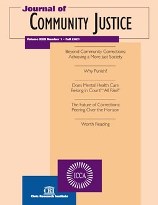Reconfiguring Risk-Need-Responsivity (RNR) Assessment Based on the Recent Influx of Research on Trauma and Recidivism
Author: Ralph Fretz, Ph.D., ABPP.; Bradford Bogue, MA.
Source: Volume 32, Number 03, Spring 2023 , pp.5-11(7)

< previous article |next article > |return to table of contents
Abstract:
Risk/needs assessments in the criminal justice system have evolved from clinical judgment to the risk-need-responsivity (RNR) principles, which have become the dominant model in criminal justice assessment and treatment, and many well-validated risk/needs instruments are based on the RNR model. As with any other scientific model, RNR needs to adapt to new and convincing evidence from meta-analyses. Trauma, particularly complex trauma, plays a significant role in the genesis of many dysfunctional behaviors, including engaging in criminal activities. Given the plethora of data supporting trauma’s role in criminal justice involvement, this study proposes that RNR adopt a more substantial position in using trauma data to assess and treat criminal-justice-involved individuals. This paper describes the current findings from trauma research and the ways in which the sequelae from trauma, if left untreated, can form a significant underlying cause of current dynamic risk and needs. It discusses the current assessment and treatment approaches to trauma and argues that the data support the development of assessment and treatment modules to address this factor.Keywords: Risk/needs assessment, risk-need-responsivity (RNR) model, trauma-informed assessment and treatment, posttraumatic stress, Level of Service Inventory (LSI), dynamic risk factors
Affiliations:
1: Private Practice; 2: Consulant.